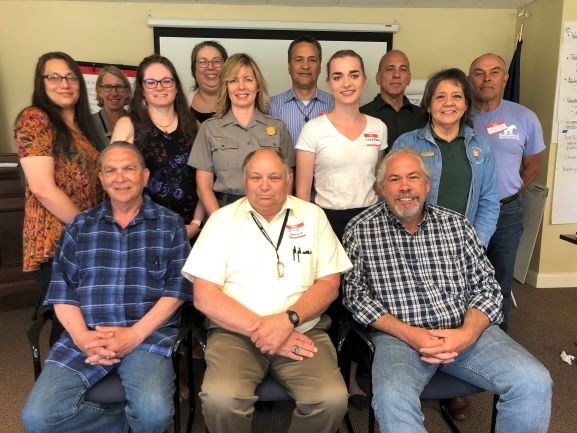Last updated: November 27, 2019
Article
Tribal Partners and Formal Consultation in Virginia

NPS Photo
Attendees at the Werowocomoco formal consultation on May 3, 2019. Pictured are: (seated) Chief Earl Bass, Nansemond, Chief Gerald Stewart, Eastern Chickahominy, Chief Robert Gray, Pamunkey. Middle row: Administrative Assistant Doris Ann Austin, Eastern Chickahominy, Alisha Deegan, NPS, Superintendent Kym Hall, COLO/CAJO/FOMR, Carolyn Black, Chesapeake Conservancy, Karen Wilde, NPS. Back row: Cindy Chance, NPS, Christine Lucero, NPS, Councilmember Troy Adkins, Chickahominy, Tribal Liaison Reggie Tupponce, Upper Mattaponi, Councilmember Jerry Fortune, Rappahannock. Photo: NPS
The six tribes –Upper Mattaponi, Rappahannock, Pamunkey, Nansemond, Eastern Chickahominy, and Chickahominy – consider themselves Powhatan-descendant tribes. Powhatan, also known as Wahunsenacawh, was a political and spiritual leader, and father of Pocahontas, who made Werowocomoco his home. Scholars believe that 30 tribes in tidewater Virginia paid tribute to Wahunsenacawh. For hundreds of years before Powhatan’s time, Werowocomoco had been a site of deep spiritual significance and a seat of power. When the English arrived in 1607, permanently as it turns out, Werowocomoco is where English leaders came to visit and negotiate with the most influential leader of Native people in tidewater Virginia. The property known as Werowocomoco is now owned by the National Park Service and managed as a component of the Chesapeake Trail. The site is closed while NPS and its partners plan for its future.
Superintendent Kym Hall invited the co-chairs of NPS Resource Group CIRCLE (Council for Indigenous Relevance, Communication, Leadership and Excellence) to attend the consultation and to share their experiences as tribal liaisons collaborating with tribal partners to tell Native truths at Native sites. Karen Wilde (Muskogee(Creek)/Pawnee) is from Sand Creek Massacre National Historic Site in Colorado, and Alisha Deegan (Hidatsa/Sahnish) is from Knife River Indian Villages National Historic Site in North Dakota.
Karen and Alisha’s participation was highly valuable in two ways. First, they each have expertise in conducting formal consultation and in training NPS employees to develop consultation skills. While NPS Chesapeake Trail staff have good relationships with tribal partners, and had developed a good framework for this consultation, Karen and Alisha provided many refinements to the preparation materials and to the consultation event which greatly improved the experience. Second, both of their parks serve as models of tribal community engagement for this new park, and in maintaining a beneficial partnership between a park and its tribal partners.
Describing the experience, Superintendent Kym Hall said, “It continues to be an honor to steward such a special place as Werowocomoco. Tribal leaders and citizens are deeply invested in the stories, preservation and the sharing of this place with all people. We were so fortunate to have Karen and Alisha from CIRCLE to help guide us through our discussions and bring valuable lessons-learned to the table. It was a highly productive day and another step closer to being able to share this important site with the world.”
